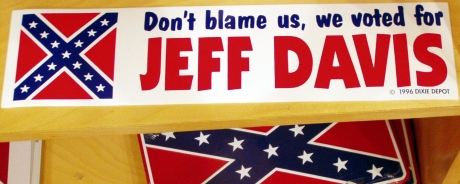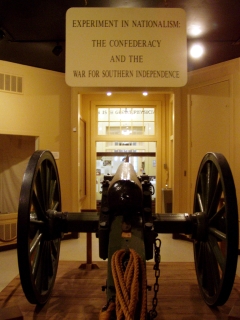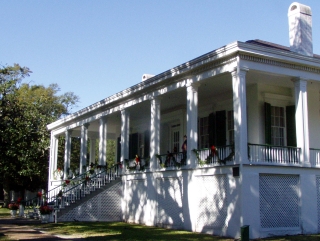Biloxi, Miss.
Local Website
 WHAT IS IT?
WHAT IS IT?Large cottage and 51-acre estate overlooking the Gulf coast of Mississippi. Final home of Jefferson Davis, later a home for Confederate Veterans and now, the site of the Jefferson Davis Presidential Museum and Library.
BEAUTY (8/10)
Sarah Dorsey, the widow who owned the property and invited the Davis family to use it after the War gave the estate its name, Beauvoir, or “beautiful view.” She didn’t need to look far for inspiration. If one tires of the unspoiled view of the Gulf coast, simply turn around and walk through the carefully manicured gardens which stretch back to a wide creek shaded by majestic trees. The Site is explored via self-guided walking tour. Visitors are welcome to stroll on nearly all of the Site’s 51 acres.
The raised cottage is simple and elegant, suited to the long, hot days and frequent flooding of the southern Mississippi coast. Windows stretch from floor to ceiling. Sliding doors open each room to a spacious foyer, allowing for maximum breeze potential. Porches wrap around the entire cottage, which sits at least 10 feet above sea level. Each room of this Greek Revival residence is sparsely furnished, symmetrically square with ceilings you couldn’t reach if you tried.
Beauvoir is a complete juxtaposition of the presidential homes of New York and New England, constructed to contain warmth and purposefully cluttered to keep the heat inside.
 HISTORICAL INTEREST (6/10)
HISTORICAL INTEREST (6/10)This estate provided sanctuary to the first and only President of the Confederate States of America and his family after the Civil War. Davis wrote two books and a number of articles in this Library Pavilion.
CROWDS (4/10)
At least 200 middle school students wound their way around the grounds of Beauvoir while we were there, bringing with them the noise and crowd issues that large groups of excited kids do. We were able to see and enjoy all of Beauvoir, but not without some strategic re-ordering of stops on the self-guided tour.
EASE OF USE/ACCESS (4/5)
Beauvoir lies right along beautiful U.S. Route 90 near Biloxi’s many Gulf shore casinos. It is well marked and there is ample parking space.
CONCESSIONS/BOOKSTORE (3/5)
Instant grits, mint julep syrup, canned opossum (really?), sauces and Southern cookbooks are all here, as are mugs, shirts, flags, earrings, pencils and pens proudly bearing the Stars and Bars or the Confederate battle flag. One can purchase an abridged version of The Rise and Fall of the Confederate Government, Davis' account of Southern secession and the War Between the States or pick up a few biographies of the leader of the Confederacy. Missing are the volumes of texts dedicated to the War of Northern Aggression or Southern Secession (depending on the author) that we have seen at other Civil War sites. Book selection at Beauvoir is meager at best.
COSTS (2/5)
We took advantage of a AAA discount and got in for $13.50. Regular admission to Beauvoir is $7.50 per adult, $4.50 per student. Children under 6 are free.
 RANGER/GUIDE TO TOURIST RATIO (3/5)
RANGER/GUIDE TO TOURIST RATIO (3/5)Two women staffed the front desk and gave us helpful suggestions on how to veer around the large amorphous groups of middle schoolers also enjoying this sunny day at Beauvoir.
We encountered only one educational Guide during our stay, a costumed female docent stationed in the Beauvoir House lobby. She was terrific, answering all our questions in her deep voiced, slow and comforting Mississippi drawl. She was so kind that even two skeptical Yankees felt comfortable and welcomed.
TOURS/CLASSES (6/10)
From the moment we stepped into Beauvoir we realized, “this isn’t the way we were taught the Civil War up North”. We saw multiple panels dedicated to Jefferson Davis’s deep belief in the power of the United States Constitution and his place as a descendent in Thomas Jefferson’s tradition of State’s Rights advocacy. We saw the Civil War described as one of northern aggression rather than southern obstinacy, one where the Rebels were defending their land and not trying to divide the Union, for they were the ones upholding the Union’s true principles. It was history from the perspective of the loser, a vision of heroism, defiance, resistance and extreme struggle in the face of a well-funded, ruthless, uncaring enemy. The Museum is decidedly one-sided.
There was very little mention of slavery. It takes some diligent reading through the panel lines to figure out that Davis owned slaves. Disclaimers mark a soldier’s exhibit stating that 90% of southern soldiers did not own slaves; they merely fought to protect their homeland against invasion. They were not fighting to oppress black people; they fought to defend their families. Of course, we Northerners, both today and in 1861 believe the Civil War is about different self-righteous reasons. Our perspectives will never change, but that does not immediately mark us as Yankee aggressors or Southern racists. We learned many uncomfortable truths about our nation during our visit to Beauvoir. The most striking being that we have not changed much since the War because we still refuse to listen to and accept each others beliefs.
 FUN (7/10)
FUN (7/10)Curiosity made us stop at Beauvoir. The idea that the first and only President of the Confederacy would have a Presidential Library frankly never crossed our minds.
The Museum is not large; there are no revelations or “ah ha!” moments at the Site, just a familiar history told from a different perspective than we Pennsylvanians are used to hearing. With so many Civil War Battlefields and Sites on the agenda, it seems only right to try to comprehend this defining event in American history from all angles. Beauvoir did not present a well-rounded discussion of the War, but from its beginnings as a large plantation, to photos of the Confederate Veterans Hospital, to the tropical flowers which scent its gardens it personalized and introduced to us the Southern experience.
WOULD WE RECOMMEND? (6/10)
We suppose it was silly of us to expect an in-depth, questioning, multi-perspective presidential library like the ones we found at Harry Truman’s and Herbert Hoover’s sites. Unbelievably, the Civil War is still a touchier subject than the dropping of an Atomic Bomb and the Great Depression. We saw none of Davis’s warts, just a reluctant State’s Rights hero fighting to uphold his proud way of life in the face of untold odds. Even so, the story told at Beauvoir is fascinating and done in an effectively sympathetic way. The grounds are gorgeous and the learning experience helpful. If you find yourself along Mississippi’s Gulf Coast, leave the casinos for a few hours and visit Beauvoir.
TOTAL 49/80
www.usa-c2c.com
© 2004-06